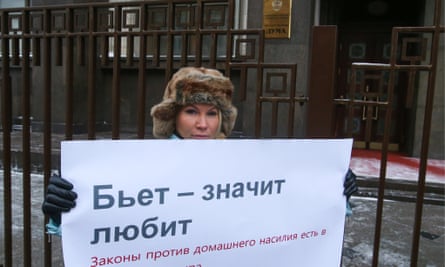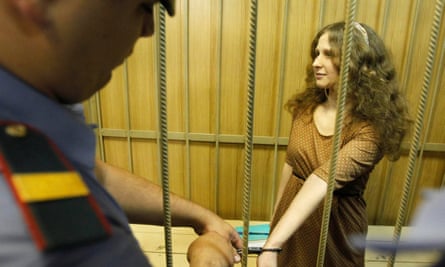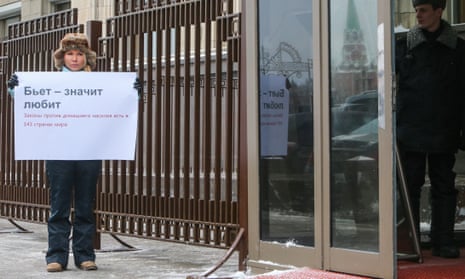Vladimir Putin has signed into law a controversial amendment that decriminalises some forms of domestic violence.
The amendment, which sailed through both houses of Russian parliament before Tuesday’s presidential signing, has elicited anger from critics who say that it sends the wrong message in a country where, according to some estimates, one woman dies every 40 minutes from domestic abuse. It makes “moderate” violence within families an administrative, rather than criminal, offence.
From now on, beatings of spouses or children that result in bruising or bleeding but not broken bones are punishable by 15 days in prison or a fine, if they do not happen more than once a year. Previously, they carried a maximum jail sentence of two years.

Alena Popova, an activist who has campaigned against the law, said it would be fine to pass the amendments if a draft law specifically aimed at tackling domestic violence was passed at the same time. But that law, which provides for restraining orders and other safeguards in domestic abuse cases, is stalled in parliament and is not expected to be passed.
“Passing these amendments and not passing the other law is another sign that our society refuses to take this problem seriously,” she said.
Defenders of the law say it closes a nonsensical loophole by which violent acts committed by family members are punished more harshly than those committed by strangers.
“The question is not whether it’s OK to hit or not. Of course it isn’t. The question is how to punish people and what you should punish them for,” said Olga Batalina, one of the MPs who drafted the law.

Others claim the law is about protecting Russian traditions according to which the family is sacred. Priest Dmitry Smirnov, head of the Russian Orthodox Patriarchy’s commission on family matters, said on a television programme that the idea the state should be able to poke its nose into family affairs was a western imposition on Russia. “Some of the things happening in northern Europe now are such that even Hitler couldn’t have dreamed them up,” he said.
Some of the mainstream discussion around gender and domestic violence in Russia can be shocking.
An article last week in the science section of the popular tabloid Komsomolskaya Pravda cheerfully told readers about an “advantage” of wife-beating. It said: “Recent scientific studies show the wives of angry men have a reason to be proud of their bruises. Biologists say that beaten-up women have a valuable advantage: they more often give birth to boys!” The article was later amended.
Popova said that during her one-woman protest outside parliament, various people had insulted her. Some had claimed she was paid to protest by western governments, while others told her that some women simply deserved to be beaten, she said.
Discussion of the bill in parliament coincided with the women’s marches in Washington DC and around the world in the aftermath of Donald Trump’s inauguration as president, provoking a broader discussion about the problem of domestic violence and the role of women in contemporary Russia.

In Moscow, there was no official march organised, partly due to lack of interest, and partly because of the difficulty in gaining permission to march from the Russian authorities. A planned demonstration against the domestic violence amendments has been repeatedly stymied by authorities.
Margarita Grigoryan, a Moscow-born businesswoman who grew up in London but moved backed recently to open a business, organised a short walk around the Russian capital. About 15 people took part. “I was depressed that someone so overtly misogynistic could get into the White House, and especially being in this country, I felt I wanted to protest, but there was nothing at all organised here,” she said.
Political analyst Maria Lipman said the situation around gender roles in Russia was paradoxical. “The Soviet period saw gender equality from above, so some of the rights that women in the west fought for were granted or even imposed on Russian women,” said Lipman.
“This meant that the way gender relations developed was different, and Russian women never had to fight for their rights. Now on the one hand we have huge problems with unequal pay, with no women in politics, with domestic abuse, but on the other hand there are more top [female] editors of leading media outlets than in the United States, and there are many top women bankers, for example.”
Nearly 300,000 people signed a petition organised by Popova to protest against the amendments, and a recent online campaign also attempted to bring the domestic abuse problem out into the open. Using the hashtag #Iamnotscaredtospeak, thousands of Russian women shared their stories of sexual harassment, violence and rape on social media. The tidal wave of terrible stories shocked many Russians, and prompted something of a discussion. But there is a major disparity between the attitudes of Russia’s urban middle class, and the situation in the regions.
“There is a big constituency in Russia for whom interference in family affairs can be portrayed as another issue in which the west is trying to impose its views on Russia,” said Lipman.

Maria Alekhina, of the Pussy Riot protest group, said the legal amendments were a red herring, and it was Russian society and attitudes as a whole that needed to change to help alleviate the domestic abuse situation.
Alekhina spent nearly two years in prison for carrying out a “punk prayer” in Moscow’s main cathedral in 2012, and said between a quarter and a third of the women she met in jail were there for attacking abusive husbands: “They were usually women who had been beaten up for years, and there was nowhere for them to go. We have no social help and no psychological help available. So one day they just pick up a knife and kill their husbands.”
